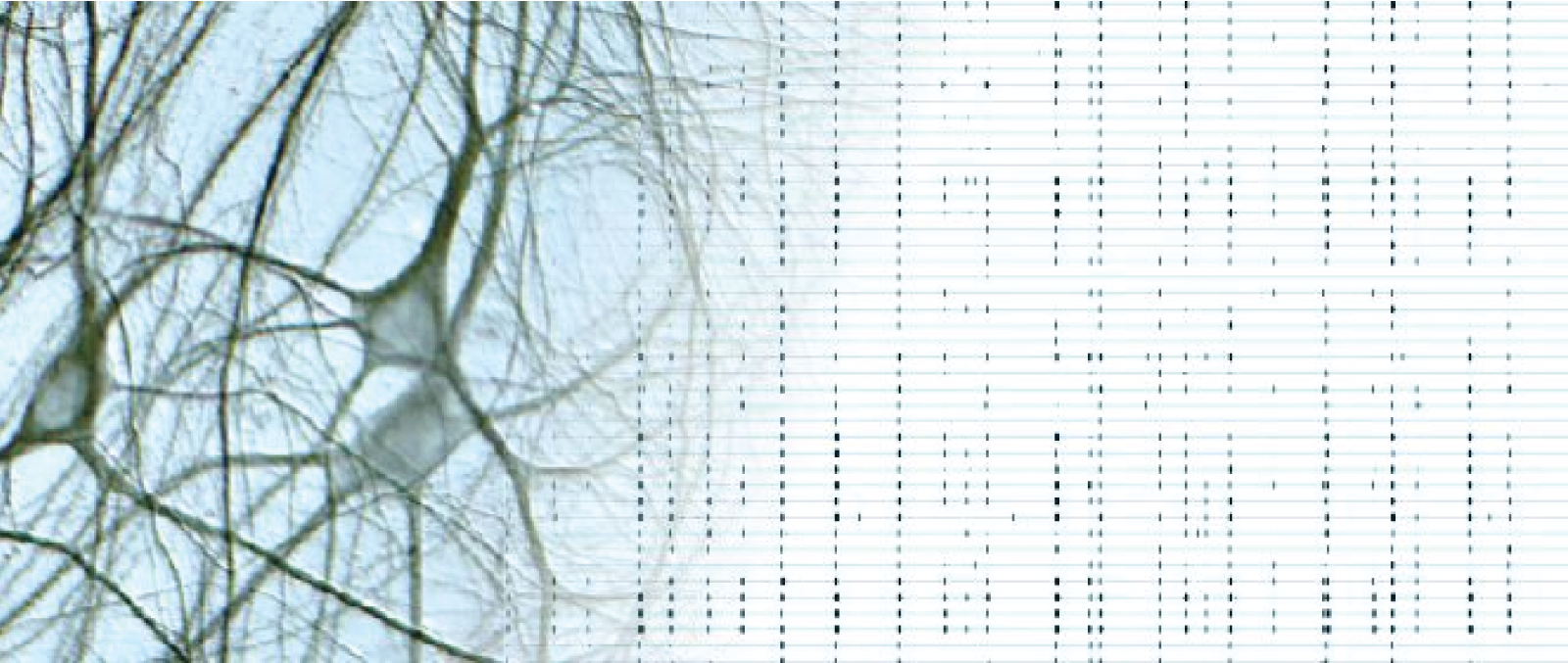
Screening for Phenotypic Activity Patterns
Welcome to NeuroProof - Your Trusted Partner CRO in Neuroscience

Screening Services for the Pre-Clinical Development of Neuro-Pharmaceuticals and Neurotoxicity
At NeuroProof, we are at the forefront of cutting-edge research in the field of neuroscience. As a leading Contract Research Organization (CRO), we specialize in providing high-quality pre-clinical services focused on neuropharmaceuticals and neurotoxicity testing. Our innovative Microelectrode Array (MEA)-based phenotypic screening and artificial intelligence-driven analysis help accelerate the discovery of new treatments for neurological disorders.
Our services include the cultivation of neuronal cultures on MEA chips, medium-throughput screening of test agents, recording of spontaneous and compound-induced network activity, state-of-the-art mathematical analyses, and sophisticated pattern recognition methods. NeuroProof is your partner for developing new in vitro disease models with its functional phenotypic screening technology.
Our Services
Neurotoxicity
NeuroProof has developed a broad range of in vitro tools to assess neurotoxicity. Utilizing our in vitro assays with primary neuronal cell cultures from mice, rats, and human iPSC-derived cell cultures, we offer precise assays to evaluate specific neurotoxic threats for neuronal toxicology screening.
Neurotoxicity ►Disease Models
Functional phenotypic screening has enormous importance in CNS drug discovery. NeuroProof offers in vitro disease models that incorporate the advantages of the phenotypic screening approach. In vitro, CNS disease models contain complex neuronal cell cultures and are a real alternative to animal models in the early phases of drug development and compound profiling. We offer disease models with primary neuronal cell cultures and human IPSC-derived neuronal cell cultures. From human iPSC-derived cell cultures we develop models for rare diseases.
Disease Models ►Functional Phenotypic Screening
Phenotypic screening is the most successful screening approach in CNS drug discovery. All definitions of phenotypic screening refer to a physiological read-out as a phenotype of a complex cell system in vitro or in vivo. Phenotypes described by the electrophysiological activity of neuronal networks are ideal for phenotypic screening since they incorporate the natural physiological function of the brain.
Phenotypic Screening ►Neuronal Maturation
MEA neurochips are a valuable tool for detecting compound effects on neurodevelopment. Using the MEA-neurochip technology, we can directly monitor and characterize the maturation of primary mouse or human iPSC-derived network activity in electrically active neuronal networks.
Neuronal Maturation ►Target validation
In many examples, we have demonstrated receptor validation with standard pharmacology methods. For this, we pretreat cultures with a confirmed antagonist of a specific receptor and test a compound in an MEA experiment to see if this pretreatment neutralizes the compound effect.
Target validation ►Molecular Biology
We combine our MEA-neurochip approach with state-of-the-art molecular biology assays and bioinformatics tools, to support, optimize and validate it. In this way the functional outcome can be correlated with data on the molecular level.
Molecular Biology ►
Disease models
Neuropathic Pain In-Vitro Model
Neuropathic pain is caused by a lesion or disease of the somatosensory nervous system. Prevalence of neuropathic pain is from 3% to 17% of population. Neuropathic pain impacts negatively patients’ life and their social environment. Mood disorders, depression, and anxiety are common consequences. A special form of neuropathic pain is trigeminal pain.
Neuropathic pain model ►Schizophrenia Models
Schizophrenia, a complex disorder affecting 1% of the population, presents challenges in treatment, particularly in addressing negative symptoms and cognitive impairments together. We have developed assays that mimic immunological and neurodevelopmental aspects of schizophrenia. These electrophysiological assays correspond with electrophysiological data from schizophrenic patients.
Schizophrenia Models ►Amyotrophic Lateral Sclerosis
Amyotrophic lateral sclerosis, ALS, also called Lou Gehrig's Disease, is a fatal, late-onset disease with severe diagnosis and no cure today. ALS targets motor neurons, causing their loss and, eventually, damage to motor function and muscle movement. We have developed a broad portfolio of ALS disease models with human iPSC-derived motor neurons.
ALS ►ALS Imaging Assays
NeuroProof Systems GmbH offers high-content screening assays with automated microscopy for the phenotypic screening of new ALS therapeutics. We deliver quantitative analyses of morphological biomarkers relevant to ALS. Based on its broad MEA experience with human iPSC-derived cell lines, NeuroProof Systems GmbH develops optimal imaging assays.
ALS Imaging Assays ►ALS Cell Models
NeuroProof has developed, optimized, and characterized with its partner BrainXell human iPSC-derived spinal motor neuron cultures and co-cultures with astrocytes, microglia, and oligodendrocytes.
ALS Cell Models ►ALS Hyperexcitation Model
Amyotrophic lateral sclerosis, ALS, also called Lou Gehrig's Disease, is a fatal, late-onset disease with severe diagnosis and no cure today. ALS targets motor neurons, causing their loss and eventually, the damage of motor function muscle movement. ALS occurs as bulbar or spinal ALS.
ALS Hyperexcitation ►ALS Biomarker Assays
We translate ALS biomarker research into standalone or supplementary biomarkers for your screening projects.
ALS Biomarker Assays ►Epilepsy
Epilepsy is a common neurological disorder characterized by recurrent seizures, with many patients unresponsive to existing treatments. At NeuroProof, we tackle this challenge through advanced in vitro screening assays that explore the mechanisms of epileptogenesis and assess new antiepileptic drugs. Our diverse assay models include the 4-AP Model, which simulates seizure activity; the SCN1A Model, which focuses on mutations related to Dravet syndrome; and a Developmental Model examining the role of developmental factors in epilepsy.
Epilepsy ►Epilepsy Developmental Model
The epilepsy developmental model models ictal events in neuronal cultures, which are comparable to ictal events in humans. These ictal events are caused by the interruption of developmental processes in the hippocampus.
Epilepsy & Development ►Glutamate Excitotoxicity Assay
Overactivation of glutamate receptors is a fundamental mechanism in neurodegenerative diseases it impairs cellular calcium homeostasis, activates nitric oxide synthesis and generation of free radicals causing programmed cell death.
Glutamate Excitotoxicity ►SCN1A – Dravet Syndrome Assay
Loss of function of the SCN1A gene is the cause of Dravet syndrome, a catastrophic form of epilepsy.
SCN1A Dravet Syndrome ►4-AP – Epilepsy Assay
The Potassium K+ channel blocker 4-aminopyridine (4-AP) induces epileptiform activity in in vitro preparations and is a potent convulsant in animals and man, Our 4-AP model is a versatile model for Epilepsy.
4-AP Epilepsy Assay ►Parkinson's Disease
Parkinson’s disease (PD) is caused by a specific loss of dopaminergic neurons in the substantia nigra/midbrain and the resulting lack of neuronal signals into the striatum, which leads to motor and cognitive dysfunctions. Parkinson’s disease etiology is only partially understood. Disease models cover a wide range of approaches by using Parkinsonism-provoking agents such as MPP+, Rhotenon, or 6-OHDA or modeling this neurodegenerative disease with suspected disease-relevant proteins such as alpha-synuclein filaments.
Parkinson's Disease ►Alzheimer's Disease
Alzheimer’s disease (AD) is caused by soluble beta amyloid, Abeta, aggregates/oligomers leading to neuro-degeneration and cognitive impairment which is one of the major hallmarks in AD.
Alzheimer's Disease ►Fragile X Syndrome
Fragile X syndrome is the most common form of inherited cognitive disability. FXS patients also show symptoms that belong to the autism spectrum disorder symptoms. FXS is a neuro-developmental disease with a prevalence of 1:5000 in males and 1:8000 in females. We offer a human iPSC-derived neuronal model.
Fragile X Syndrome ►News
New TDP 43 mislocalization assay
July 03, 2025 – New TDP-43 Mislocalization Assay for ALS in Human iPSC-Derived Motor Neurons: Investigating Wildtype and C9orf72 Model:
TDP-43 mislocalization and aggregation are found in 97% of ALS patients, making them key pathological features of the disease. As a result, targeting TDP-43 mislocalization represents a promising strategy for the development of new ALS therapies.
TDP-43 mislocalization assay ►NeuroProof Introduces Enhanced Screening Assays with Primary Rat Neurons
April 12, 2025 – NeuroProof, announces the launch of advanced screening assays featuring primary rat neurons.
Primary rat neurons ►Neuroproof and Doppelganger Launch Cutting-Edge ALS Screening Service Combining Metabolic and Electrophysiological Analysis
October 22, 2024 – Electrophysiology meets Metabolism: NeuroProof Systems GmbH, and Doppelganger, renowned for its Quantitative System Metabolism (QSM™) platform, are proud to announce the launch of an innovative ALS screening service. This groundbreaking collaboration combines advanced metabolic and electrophysiological analyses, offering unprecedented insights into the energy metabolism of ALS cells.
Metabolic Phenotyping ► infobox@neuroproof.com
infobox@neuroproof.com +49 381 54345-660
+49 381 54345-660